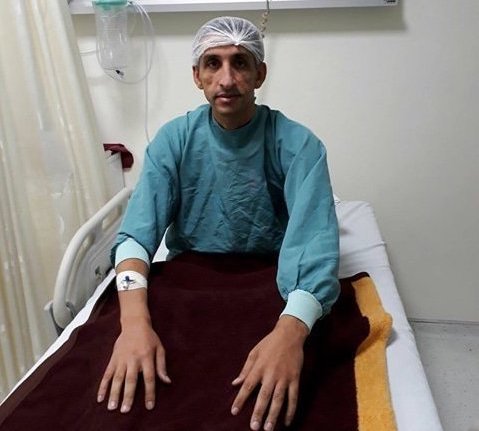Friday prayer leader denounces Iran’s treatment of Ahwazi Arabs

By Yaser Asadi, an Ahwazi rights activist
A prominent member of Iranian Assembly, an expert on Al-Ahwaz province (also called Khuzestan in Persian), and Friday prayer preacher Mohsen Haidari criticises the government policies in the region against indigenous Ahwazi Arabs people of neglecting province resources and its population’s demands.
As published by the pro-government Fars news agency, while leading Friday prayers after assembly, the expert on council election, Mr. Haidari directly accused the regime of systematic discrimination and marginalisation against Khuzestan population. He said the Iran -Iraq war had destroyed almost all of the infrastructure of the province which, causing delay or complete cessation of the province’s development. Referring to the education rank that the region was holding at the time, Mr. Haidari said the province was among the top three provinces in Iran possessing a high degree of education among its people before Iraq-Iran war, but this ratio has decreased since, putting the province as 17th in rank after the war and now the lowest level belong to AL -Ahwaz region in all of the Iran.
Mr. Haidari, who is originally Arab from Al-Ahwaz, questioned the authorities for drying marshes in the province and pointed out that this policy has a negative impact on the lives of citizens because many of the Ahwazis get their living from the fisheries and agricultural industry, which relies heavily on this water source.
In another part of his speech, Haidari also criticised the recruitment policy in the region, saying: Unfortunately, the vast majority of petrochemical managers who work for petroleum companies in Al-Ahwaz province are not from the local region, but incomers who brought from other provinces and paid all living expenses while the level of unemployment in Al -Ahwaz is the highest in Iran. He also said even petrochemical college in the city of Howeyzeh does not follow the regulations on equality when accepting students as the ratio now only four people from Al -Ahwaz out of four hundred non-local students who are currently studying there.
Mr. Haidari also mentioned the water diversion plan from Al -Ahwaz province to benefit non-Ahwazi residents in other provinces (mostly Persians) and raised his concerns about this project which has deprived the province of having clear and agricultural water and resulted in poverty and dryness in the region.
Haidari asked not to be considered a nationalist when he raises his voice to demand equal rights for Ahwazi Arabs or criticising such practices as these policies which have affected Ahwazi people negatively. He promised to follow these concerns via judicial channels.
The effects of the war are still visible in the homes of Ahwazis. Poverty and deprivation are present throughout the region.
For example, the city of Abadan for years has been suffering from evident damage and destruction in its urban infrastructure due to the negligence of its irresponsible officials. The city of “Abadan” overlooking the Shatt al-Arab was once one of the most beautiful cities in the Al-Ahwaz region, but today it only shows itself as afflicted by much damage and destruction. The city has not had any reconstruction after the end of the war between Iran and Iraq. Just like other Ahwazi areas, this city lacks well-equipped hospitals, parks, construction, housing, recreational places and other commercial and industrial institutions while the first oil refinery was established in this city.
In recent days, the number of Ahwazi Arab patients mainly elderly heavily outnumbered in the dilapidated and ill-equipped hospitals throughout Al-Ahwaz region. The newly arrived Ahwazi disadvantaged patients undergo treatment on the floor without any other option due to lack of beds in the hospitals which resemble abattoir rather than a hospital. Air and water contamination pose a dreadful hazard to Ahwazi Arab people today. The disastrous effects can be estimated in the numbers of pollution-related deaths, the number of school and work days lost to air pollution, and additional health challenges experienced by Ahwazi children, the elderly, and people with heart or lung conditions. These are drastic times for Al-Ahwaz region and instead of addressing them, the Iranian regime is exacerbating the environmental disaster for the Ahwazi Arab inhabitants by drying wetlands and stealing water from Ahwazi Rivers
Al-Ahwaz’s pollution, a decades-old crisis, has steadily grown in recent years, claiming thousands of lives of Ahwazi Arabs. On average, five persons die of pollution-related causes in Al-Ahwaz every day. According to the latest statistics from the World Health Organization (WHO), Al-Ahwaz is sitting at the top of the list of regions with the highest air pollution in the world. For years, Ahwazis have seen nothing but poverty, racial discrimination and prison and execution while the world watched the regime’s ongoing crimes without taking any action. Iranian authorities are stealing the Ahwazi oil and selling it to certain foreign companies illegally and making billions of dollars on a yearly basis whereas the indigenous Arab people of AL-Ahwaz are living on almost half a dollar a day. In addition to this tragedy for ethnic people under Iranian oppression, Iranian regime authorities are funding terrorism in Iraq, Syria, and Yemen to kill the innocent people and damaging and devastating the entire region.






















